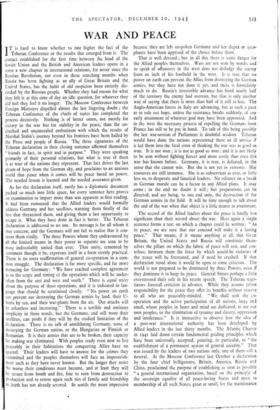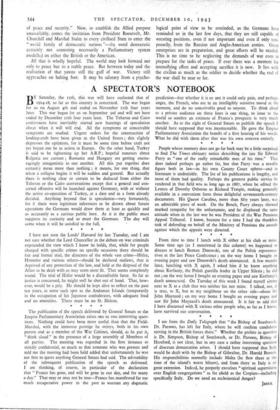WAR AND PEACE
T is hard to know whether to rate higher the fact of the 1. Teheran Conference or the results that emerged from it. The contact established for the first time between the head of the Soviet Union and the British and American leaders opens in a sense a new chapter in international relations, for never since the Russian Revolution, not even in these searching months when Russia has been fighting as an ally of Great Britain and the United States, has the habit of old suspicion been entirely dis- carded by the Russian people. Whether they had reason for what they felt is at this time of day an idle question, for whatever they did feel they feel it no longer. The Moscow Conference between Foreign Ministers dispelled almost the last lingering doubt ; the Teheran Conference of the chiefs of states has completed the process decisively. Nothing is of better omen, not merely for victory in the war but for stability in the peace, than the un- checked and unconcealed enthusiasm with which the results of Marshal Stalin's journey beyond his frontiers have been hailed by the Press and people of Russia. The three signatories of the Teheran declaration in their closing sentence affirmed themselves friends in fact, in spirit and in purpose." They were speaking primarily of their personal relations, but what is true of them is as true of the nations they represent. That fact drives the last gleam of hope from the German sky, and proclaims to an anxious world that peace when it comes will be peace based on power. The needed lesson is learned and the needed assurance given.
As for the declaration itself, rarely has a diplomatic document packed so much into little space, for every sentence here proves on examination to import more than was apparent at first reading. It had been rumoured that the Allied leaders would formally address Germany and her satellites, warning them finally of the fate that threatened them, and giving them a last opportunity to escape it. What they have done in fact is better. The Teheran declaration is addressed to no one. Its message is for all whom it may concern, and the Germans will not fail to realise that it con- cerns them vitally. The three Powers whom they endeavoured by all the limited means in their power to separate are seen to be more indissolubly united than ever. That unity, cemented by sentiment though it be, expresses itself in a form sternly practical. There is no mere reaffirmation of general co-operation in a com- mon struggle. The declaration is far more specific, and far more menacing for Germany: "We have reached complete agreement as to the scope and timing of the operations which will be under- taken from the east and west and south." There is equal unity about the purpose of those operations, and it is indicated in lan- guage that should be scrutinised closely. "No power on earth can prevent our destroying the German armies by land, their U- boats by sea, and their war-plants from the air. Our attacks will be relentless and increasing." There is a terrible and ominous simplicity in those words, but the Germans, and still more their satellites, can profit if they will by the studied limitation of the declaration. There is no talk of annihilating Germany, none of destroying the German nation, or the Hungarian or Finnish or Rumanian. It is their armies that are to be broken, their capacity for making war eliminated. With peoples ready even now to live Peaceably in their habitations the conquering Allies have no quarrel. Their leaders will have to answer for the crimes they committed and the peoples themselves will face an impoverish- ment such as they have never known. But the longer they resist the worse their conditions must become, and at least they will be secure from bomb and fire, free to turn from destruction to Production and to renew again such ties of family and friendship as death has not already severed. In words the more impressive because they are left unspoken Germany and her dupes or syco- phants have been apprised of the choice before them.
That is well devised ; but in all this there is some danger for the Allied peoples themselves. Wars are not won by words, and to speak of offensives in the west does not dislodge the enemy from an inch of his foothold in the west. It is true that no power on earth can prevent the Allies from destroying the German armies, but they have not done it yet, and there is formidably much to do. Russia's irresistible advance has freed nearly half of the territory the enemy had overrun, but that is only another way of saying that there is more than half of it still to free. The Anglo-American forces in Italy are advancing, but at such a pace as to rule out hope, unless the resistance breaks suddenly, of any early attainment of whatever goal may have been appointed. And in the West the necessary process of expelling the Germans from France has still to be put in hand. To talk of this being possibly the last war-session of Parliament is doubtful wisdom. Teheran would have done the nations represented there an ill service if it led them into the fatal error of thinking the war was as good as won. It is not won ; it is not as good as won ; and it is not likely to be won without fighting fiercer and more costly than even this war has known before. Germany, it is true, is defeated, in the sense that she cannot win. But she is not yet in extremis. Hec resources are still immense. She is as subservient as ever, or little less so, to desperate and fanatical leaders. No reliance on a break in German morale can be a factor in any Allied plans. It may come ; in the end no doubt it will ; but preparations can be directed, and are being, to one end only, the destruction of the German armies in the field. It will be time enough to talk about the end of the war when that object is a little nearer to attainment.
The accord of the Allied leaders about the peace is hardly less significant than their accord about the war. Here again a single sentence forms a text on which a chapter could be written: "As to peace, we are sure that our concord will make it a lasting peace." That means, if it means anything at all, that Grt Britain, the United States and Russia will constitute them- selves the pillars on which the fabric of peace will rest, and con- tribute between them the force by which would-be violators of the peace will be frustrated, and if need be crushed. If that declaration stood alone it would be open to some criticism. The world is not prepared to be dominated by three Powers, even if they dominate it to keep its peace. General Smuts perhaps a little overstressed their role in his recent speech. The Teheran nego- tiators forestall criticism in advance. - While they assume prime responsibility for the peace they offer its benefits without reserve to all who are peaceably-minded. "We shall seek the co- operation and the active participation of all nations, large and small, whose peoples in heart and mind are dedicated, as are our own peoples, to the elimination of tyranny and slavery, oppression and intolerance." It is instructive to observe how the idea of a post-war international authority has been developed by Allied leaders in the last thirty months. The Atlantic Charter in 1941 laid down certain fundamental guiding principles which have been universally accepted, pointing, in particular, to "the establishment of a permanent system of general security." That was issued by the leaders of two nations only, one of them still a neutral. At the Moscow Conference last October a declaration by the four chief belligerents, Britain, America, Russia and China, proclaimed the purpose of establishing as soon as possible "a general international organisation, based on the principk of the sovereign equality of all peace-loving States and open to membership of all such States, great or small, for the maintenance



























 Previous page
Previous page